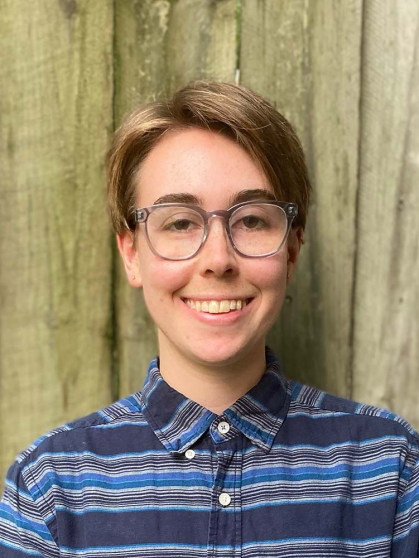In Argentina on a Fulbright Grant, Alum Engages in Cultural Exchange
Jay Schroepfer discovered their calling – translation and interpreting – at Rutgers-New Brunswick and honed their skills with study-abroad experiences
Jay Schroepfer said they lacked direction as a high schooler but found purpose at Rutgers University-New Brunswick, specifically in the Department of Spanish and Portuguese at the School of Arts and Sciences.
There, the Long Valley, N.J., resident earned a double major in English and Spanish before completing a master degree in Spanish and English translation and interpreting as part of the department’s five-year program.

Thanks to a Fulbright English Teaching Assistant grant, Schroepfer is in the city of Santa Fe in Argentina, where they teach English to students at a post-secondary institution.
The 23-year-old discusses how they gravitated toward translation and interpretation, engaging in cultural discussions with students and broadening their own language skills through immersion.
What brought you to Rutgers?
As a high schooler applying to colleges, I didn't have a clear direction or goal.
I chose to go to Rutgers because the tuition was the most affordable for me as a New Jersey resident. I stayed at Rutgers because I found community there and formed close relationships with friends and professors. I also found a program of study that interested me.
Though my decision was financially motivated, I am glad I made the choice I did.
What drew you to your field of study?

I went into undergrad undeclared. I gravitated toward the humanities and language-focused subjects, as I'd always enjoyed English and Spanish classes in high school.
By sophomore year, I'd declared my double major in English and Spanish, but it wasn't until I took an introductory translation class through the Department of Spanish and Portuguese that I knew I wanted to go into the field of translation and interpreting specifically.
Translation fascinates me, and I felt inspired by the idea that I could use an interest and skill of mine to actually serve others, be helpful and make a living. After graduating with my master’s degree, I landed a job with an in-house translation and interpreting team at Legal Services of New Jersey.
I am indebted to the Department of Spanish and Portuguese for showing me a career path and providing me with the skills and opportunities I needed to move forward.
Describe your Fulbright experience.
I work at the Instituto Superior de Profesorado No. 8, Almirante Guillermo Brown – ISP Brown for short. This school is what's known as a terciario, which is a post-secondary institution, but not a university. I’d suggest picturing it as a community college, but it’s really quite different. Most students are in their 20s, though there are some older students who already have careers and are studying a second profession at ISP Brown.
I work with students who are studying to become English teachers, translators or interpreters. I've been spending my time visiting various classes, often giving presentations on topics such as my experience as a translator in the U.S., the U.S. education system, types of U.S. slang and many other culture- or language-focused topics. I've also spent time in classes just as an assistant, offering my insight and perspective and engaging with students during class activities.
I've also started an English conversation club and am considering offering virtual tutoring sessions if there's room in my schedule.
What have you gained during your time in Argentina?
I lived in Valencia, Spain, for a semester as part of a Rutgers study-abroad program, but my experience in Santa Fe has been very different, and quite enriching.

Learning to navigate a completely new place takes time, resilience and flexibility. By “navigate,” I mean learning how to manage daily life (buying groceries, getting cash, etc.), engage socially and do your job. Regardless of where you are, there are multitudinous unspoken rules, behaviors and know-how that people use or engage in while carrying out their lives. I have to be very observant and quick on my feet to get by.
Living in Santa Fe also has taught me a new level of independence and self-reliance. My job is extremely unstructured. If I didn't put forth the effort to be involved at my school, my job essentially wouldn't exist. This work is far more entrepreneurial than anything I've done before. I've had to navigate challenges that don't really exist within the U.S. school system. However, along with this I feel a great sense of pride for having accomplished what I have.
I'd be remiss if I didn't talk about the community I'm becoming a part of in Santa Fe. In two short months, I've made some really lovely connections, largely with students and professors at ISP Brown. I know the friendships and professional connections I make here will be deeply impactful for me.
How do you plan to apply what you’ve learned moving forward?
One of the main reasons I sought out an opportunity to live abroad was to improve my Spanish skills. Spanish is a professional language for me, and I use it regularly, but for the most part I've only used it for school or for work. Living in a Spanish-speaking country is a unique opportunity for immersion and for practicing Spanish in a broader variety of social contexts. I encounter new words and concepts daily, which is really wonderful.
Along with new linguistic input also comes new cultural input. They are inextricably tied. Before this experience, I'd never been to any Latin American country, yet the vast majority of my clients are from Latin America.
I consider it my professional responsibility to be as culturally informed as possible since our job as translators and interpreters is to carry meaning across languages and cultures.
What are your plans after studying abroad?
After I finish my grant in Santa Fe, I plan to return to the U.S. and seek out a translation and interpreting job in New Jersey.
How do you spend your free time?
I am studying German at a local school here in Santa Fe. Conveniently, I end up learning more about Spanish in that class, too.
I also play viola. I brought my instrument with me to Argentina. I'm still looking for an orchestra to join, but in the meantime, I'm considering joining a choir, just to have a musical outlet.
Undergraduate and graduate students interested in applying for a Fulbright grant may contact the Rutgers-New Brunswick Office of Distinguished Fellowships or the School of Graduate Studies, respectively.


